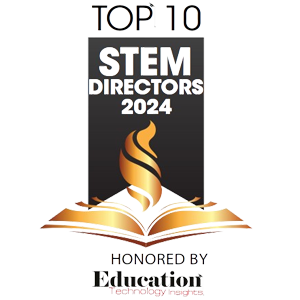THANK YOU FOR SUBSCRIBING
Be first to read the latest tech news, Industry Leader's Insights, and CIO interviews of medium and large enterprises exclusively from Education Technology Insights
Advancing Inclusive STEM Education
Jay Jessen, Director Marburger STEM Center, Lawrence Technological University
 Jay Jessen, Director Marburger STEM Center, Lawrence Technological University
Jay Jessen, Director Marburger STEM Center, Lawrence Technological UniversityAmid an increasingly complex and technologically driven world, STEM (Science, Technology, Engineering, and Mathematics) education has become essential for shaping the future. The Marburger STEM Center at Lawrence Technological University (LTU) is a pivotal force in this transformative movement, guided by the principle that STEM is for everyone. Under the leadership of Jay Jessen, it is committed to dismantling barriers and providing inclusive opportunities for students from diverse backgrounds to engage with STEM in meaningful ways.
Jessen, with two decades of experience in higher education, has a deep passion for STEM. His childhood in rural Michigan, marked by early exposure to science and technology, sparked this lifelong interest. At the Marburger STEM Center, Jessen and his team are committed to removing barriers that often prevent students from pursuing STEM careers.
Addressing the Challenges
One of the biggest challenges in STEM education is accessibility. Jessen, with his experience working with students from diverse socioeconomic backgrounds across the Great Lakes region, understands these challenges firsthand.
The Marburger STEM Center focuses on overcoming various barriers that impede student participation in STEM by providing financial support, transportation assistance, and free programming.
Jessen emphasizes the Center's impact on students' perceptions of STEM. "Many students doubt their ability to succeed in STEM. Our programs demonstrate that STEM is exciting and accessible to everyone."
For instance, during a recent middle school camp, a student initially focused solely on engineering discovered a newfound interest in science through hands-on activities. This experience helped bridge her understanding of how science and engineering intersect, showcasing the impact of their programs.
Programs like the Summer STEM Series also provide broad exposure to various STEM topics, helping students overcome negative perceptions and discover new interests. By engaging students in activities such as coding drones, they demonstrate the practical applications of STEM concepts, fostering enthusiasm and breaking down barriers to participation.
 Measuring Success and Exploring Future Opportunities
Measuring Success and Exploring Future Opportunities
Since measuring the success and impact of STEM programs is crucial, particularly when seeking funding or preparing reports, Jessen and the team at the Marburger STEM Center employ both qualitative and quantitative methods to evaluate their initiatives. This includes conducting interviews, focus groups, and surveys to gather participant feedback. They also utilize professional assessment companies to provide an external perspective on their programs' effectiveness.
In addition to in-house evaluations, which provide valuable anecdotal data, third-party analyses are also included to ensure the credibility and accuracy of their findings. This comprehensive approach helps them present robust data to donors, foundations, and other stakeholders.
Today, as new career fields emerge and previously non-STEM disciplines increasingly incorporate STEM components, the definition of STEM continues to expand.
Jessen believes the key to future growth and innovation in STEM education lies in its integration into various fields and interdisciplinary nature—aligning STEM with a wide range of subjects and career paths. To that end, Marburger STEM Center is leading this shift by collaborating with educators and school counselors through workshops and professional development programs to demonstrate that STEM principles can enhance any field, from English language arts to art and music.
For students considering a STEM career, Jessen offers simple advice— Follow your passion. He emphasizes the importance of finding a support network, whether within their schools, local STEM centers, or other resources. Jessen recalls how a mentor once advised him to stay away from STEM temporarily, a decision he later regretted. He urges students not to let external forces deter them from their goals.
The Marburger STEM Center is more than just a hub for STEM learning; it's a vital resource for the entire community. As part of a university, the Center has access to abundant resources that can support K-12 schools and other educational initiatives.
Jessen emphasizes, "STEM is for everyone, and that's the message we're spreading."
The Marburger STEM Center at LTU stands for inclusive education, breaking down barriers, and fostering a love for STEM among students from all walks of life. Under Jay Jessen's visionary leadership, they are preparing students for the future and shaping the landscape of STEM education itself.
Read Also
Beyond the Hype: What Faculty Leaders are Teaching Us about AI in Higher Education
Learning Outside the Box: Why Surgical Safety Begins with Human Factors
Supporting International Students: A Holistic and Relational Approach
Why Digital Citizenship Can't Stay in the Computer Lab
Redefining Academic Rigor in the AI Era
Building Instructional Technology That Serves People First

I agree We use cookies on this website to enhance your user experience. By clicking any link on this page you are giving your consent for us to set cookies. More info

However, if you would like to share the information in this article, you may use the link below:
www.educationtechnologyinsightsapac.com/cxoinsights/advancing-inclusive-stem-education-nid-2966.html




















